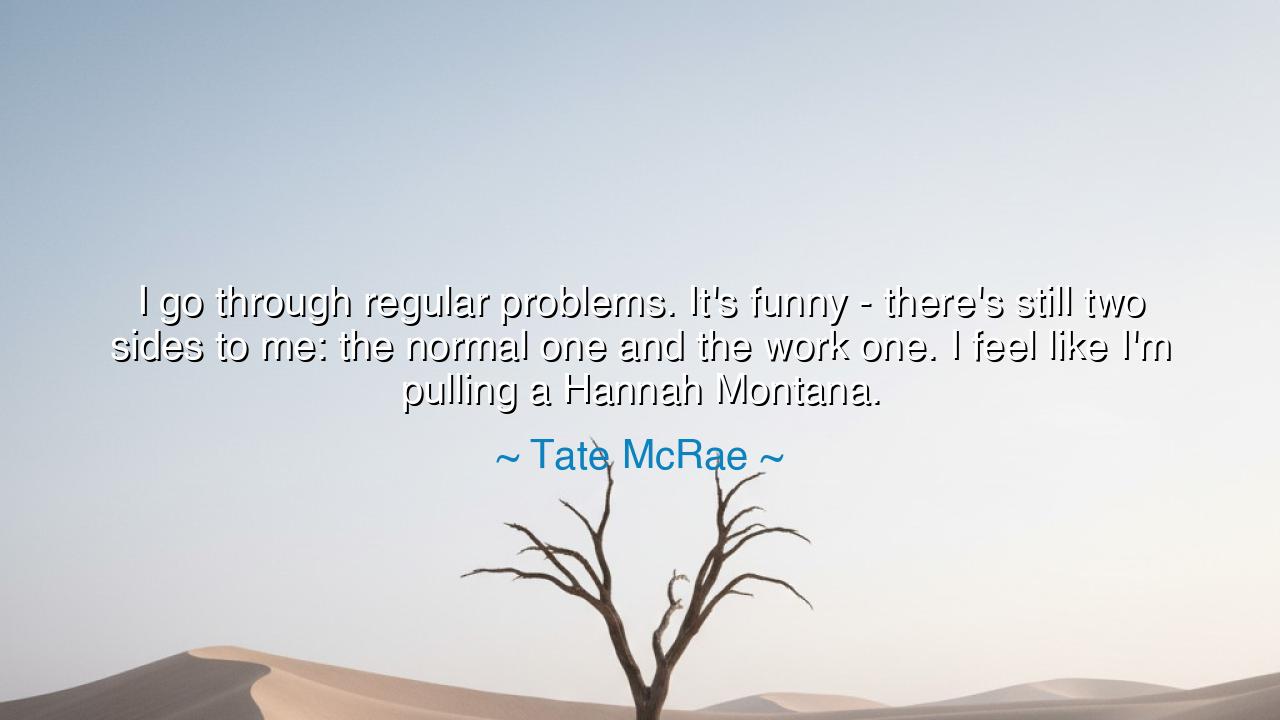
I go through regular problems. It's funny - there's still two
I go through regular problems. It's funny - there's still two sides to me: the normal one and the work one. I feel like I'm pulling a Hannah Montana.






“I go through regular problems. It’s funny—there’s still two sides to me: the normal one and the work one. I feel like I’m pulling a Hannah Montana.” Thus spoke Tate McRae, a voice of youth and contradiction, who walks the trembling line between fame and humanity. Her words, though clothed in modern humor, reveal an ancient struggle—the battle between the self we show the world and the self that dwells in silence. For what she calls “two sides” is no modern invention; it is the eternal duality of the human soul, torn between duty and desire, persona and truth, performance and peace.
In her jest—“pulling a Hannah Montana”—Tate speaks of a life divided. By day, the performer shines under the fire of lights; by night, the person seeks rest in the quiet of her own thoughts. The artist must become both: the public figure who inspires millions, and the private being who still faces heartbreak, doubt, and the raw ache of ordinary life. Fame, as the ancients might have said, is a double-edged sword—it glitters, but it cuts. To live in its glow is to forever balance between two worlds: the stage and the soul.
The ancients themselves wrestled with this division. Marcus Aurelius, the philosopher-king, ruled an empire by day and wrote meditations for his own heart by night. In his tent among soldiers, he confessed his weariness with the masks of power. Though surrounded by glory, he yearned for simplicity, for the honest voice within. He too lived with “two sides”—the emperor and the man, the figure and the feeling. Like Tate McRae, he might have said, “I go through regular problems,” for no crown or stage can shield the spirit from its human storms.
This duality is the price of creation and of growth. Every soul that strives for greatness must learn to live between these halves. The normal self craves belonging, safety, and rest. The work self demands discipline, courage, and vision. If one dominates, the other withers. The worker without humanity becomes hollow; the dreamer without purpose drifts away. Thus, the wise learn to walk the narrow bridge between their worlds, allowing each side to feed the other—the private heart giving warmth to the public act, the public act giving meaning to the private heart.
There is a bittersweet humor in this dance, and Tate calls it “funny.” It is the laughter of recognition, the knowing smile of one who sees the irony of modern life. We live in an age where many must perform—online, at work, even among friends—crafting images and roles as carefully as the actors of old. Yet beneath every glowing profile lies a second life unseen: the quiet one, the truer one. The challenge of our time is not to destroy this duality, but to master it—to let both faces belong to one honest soul.
Consider also Hannah Montana, the character Tate invokes—a girl who lived as two people: the idol and the ordinary. Her story, though wrapped in glitter and song, is an allegory for us all. We too wear disguises, playing roles to meet the world’s expectations while guarding the tender truth within. The wisdom lies not in abandoning one side, but in reconciling them—to sing on stage with sincerity, and to return home without shame. The world will always ask us to divide ourselves; only we can decide to remain whole.
So, dear listener, take this as your lesson: tend both sides of yourself. Honor the self that works and dreams, but also cherish the one that rests and feels. Do not believe that strength requires you to abandon softness, or that success demands you forsake sincerity. Let the light of your “work self” shine, but never let it blind the quiet glow of your “normal self.” Balance them as the moon balances its shadow, each completing the other.
For as Tate McRae reminds us, even in the age of fame and illusion, we are all still human. We laugh, we stumble, we wrestle with our reflections. To live truly is to unite these halves—to perform with authenticity and to rest without regret. Then, and only then, the two sides become one: the whole and radiant self, both extraordinary and ordinary, shining in harmony beneath the same eternal sky.






AAdministratorAdministrator
Welcome, honored guests. Please leave a comment, we will respond soon